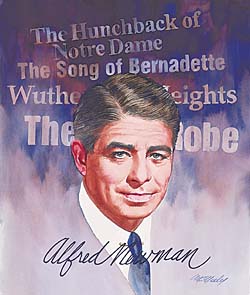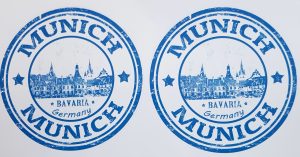Munich Nights Chapter 26: “Geli Raubal’s Lost Diary And An Important Encounter With An Academic”

Heinrich stood watching his staff car depart into the folds of the Munich night. Then he turned and beckoned one of the passing white-coated waiters. He requested that Herr Hess, Doctor Goebbels, Captain Goring and Herr Frick please join him in one of the few secluded tea rooms. He had decided on the most spacious one for its users’ privacy and discretion. Later convenient table telephones would be installed to each room offering a semblance of further privacy to the guests.
“We may have a problem arriving our way gentlemen …” he began sitting down and removing his wire-rimmed glasses. His wife had always told him jokingly that he looked ten years younger without them. But he continued now almost gravely: “that could descend on us and our party rather like that infamous floating iceberg that destroyed the once mighty and unsinkable Titanic” he informed them now with urgency as they were seated attentively around him. The four men looked at each other before Wilhelm Frick requested Heinrich to “please elaborate.”
“Gentlemen that metaphorical iceberg could perhaps sink our own party’s electoral prospects during the impending elections which as you know are about to arrive and we must win … perhaps sooner than we think!”
He let this disclosure gently settle into the still room like a descending gipsy moth.
“NO. I have not spent over ten years of my life driving around the country on my trusted motorbike addressing meetings in snowstorms and in horrendous heatwaves many times and over many years with officer Walter Kyper to now witness that this could all be destroyed like a child’s sandcastle.”
Then he proceeded to say quietly as he replaced his glasses: “Some of our comrades have suggested rather foolishly that there has been some loose talk of a future marriage (perhaps emanating from the barracks or from our enemies) between Fraulein Raubal and Adolph. However, gentlemen, I can inform you now there will be no marriage – NEVER EVER!”
He allowed this desired statement to register with the silent four. None contradicted him or would. All knew it was for their own career and advantage that this disaster concerning Geli and Adolph to never be allowed to happen. Wilhelm Frick had learned years before as a prosecuting lawyer for the Munich Justice Office that the least you said in any conversation the more you usually learned about your opponent by just listening. So now he naturally kept his own counsel. After all, wasn’t silence supposed to be golden?
Rudolph Hess who had been wounded in the chest and lungs in 1917 and would suffer in later years with the reoccurring and annoying habit of frequently clearing his throat listened intensely. His coal-black eyes always resembled a cold bleak night on the Savannah plain a noted French explorer had once remarked to Heinrich concerning Hess and his ‘creepy’ unblinking gaze. He now remained silent as well. Joseph Goebbels was heard to say twice as if to himself, “Yes, it makes sense she has become an annoying irritant.” Hermann Goring chewed on his now unlighted corona cigar stub. A look of determination had creased his unlined forehead. He nodded at his old friend. It was an unspoken nod of approval that Heinrich accepted and knew that it would not be denied him
Poor and trusting and unhappy naive Geli. It seemed her fate now had been decided by these men in a closed room and she, as usual, would be oblivious, as always, to the end. Heinrich then suggested an idea that had been festering in his mind for several weeks of how this possible political problem could and would be averted. Skillfully and quickly!
(In researching the short and tragic life of Angela Maria ‘Geli’ Raubal, I recently stumbled across this unpublished yet important essay on a website written shortly before his death by the distinguished American historian Professor Maxwell James Newman. In a short précis of his article, he wrote: ‘The tragic suspicious death of this twenty-three-year girl allowed Geli to be cast unknowingly and unprepared into that nest of dangerous Nazi vipers. Her musical ambition apparently was to succeed as a singer perhaps to excel in operetta or perhaps even opera. This vocation, if it had materialized, was to be denied to her. Geli’s talents if allowed to flourish might have witnessed her bring something special of her own still emerging personality. Perhaps to tackle the roles of the vengeful Jenny in the ‘Threepenny Opera’ or to the wonderful rewarding role of Kathie in the ‘Student Prince’?”)
Eighty-nine years after her death either by her own hand or suspiciously by others, which I rather suspect happened, I have to suggest that she was to be one of the first innocent victims of the Nazi persecution which was later to become referred to as the Holocaust. Yet for Geli today there is no memorial to her own brief life that ended much too soon. A sad end for a sad girl.
Today her final resting place is located in an Austrian cemetery and is now overrun by weeds alongside the discarded daily debris of a busy Metropolis. But in retrospect, her own brief life I suggest is the story of a grand opera. And within its libretto, all the musical ingredients of jealousy, anger, betrayal and murder are waiting still to be revealed by a future composer and his favoured librettist one day. I look forward hopefully to hearing this musical tragedy derived from the creative mind of some young composer and their always faithful librettist.
Professor Newman sadly died before his final published article could be completed on Geli Raubal. But an edited version was posthumously published with the kind permission of his daughter doctor Laura Newman. She had allowed this to be used as a study paper concerning the dying days of the Weimar Republic (1919-1933). That paper is located today in the history department of the prestigious Millgate University in Southern California where incidentally his daughter Laura then occupied the prestigious chair on Quantum Physics. She was also a visiting lecturer at the controversial Jesuit Loyola University in Chicago.
Some years ago purely by chance, I was fortunate to arrange a brief meeting with her via e-mail at the Hay hotel in Chelsea. She was then travelling through London she informed me to meet with her English publishers and to discuss a future science programme to be later aired on Channel 4. Then she was booked the next morning to fly on to Rome for a television interview on Mediaset television. We had arranged at short notice to meet in the hotel’s then popular Schooner bar.
That meeting had got off to a rather prickly start I recall with Dr Newman informing me that she had just woken up and had a dose of jet lag and she really could only possibly spare me ten minutes. I was disappointed at hearing this suggestion. She was a tall woman I recall probably in her mid-fifties and rather resembled that late actress from Ulster Greer Garson. She displayed no wedding ring and she wore her long greying hair pulled back into a ponytail secured with a basic rubber band. She was dressed in a grey fleece tracksuit sporting the bright logo of the Millgate University and wore worn running shoes. Maybe she was hoping later to go for a run around Hyde Park as many American Tourists usually do.
The information she tentatively offered to me was that her father had a great interest and curious affection for Geli Raubal and that displayed on his office desk for many years alongside a group family picture of her mother, herself and her sister was a framed black and white tinted portrait of a smiling Geli. He often referred to her as his third lost daughter for some strange reason. During this preamble, she was frequently checking her expensive Tag Heuer wristwatch, and obviously becoming bored with our meeting. I suddenly recognised a violin being played over the concealed expensive CD sound system. We both listened trying to identify the composer and we both spoke almost in unison: “Korngold!” Then we both laughed.
The tense mood between us was broken. We then slowly discovered we both shared an affection and admiration for the 1940s American film noir, as well as the wonderful atmospheric music of that lost golden era that always highlighted those composers’ brilliant musical interpretation in any film presentation they were commissioned to compose.
Maybe as a young student, she had escaped from the outside world and the campus routine spending many hours alone in darkened cinemas living her life through the lives of those portrayed on that addictive silver screen, she wouldn’t be the first. She laughed when I enquired if the legendary film composer Alfred Newman was perhaps a relative.

“I wish he had been. But I do so adore his music, it’s so atmospheric and almost spiritual to listen to.”
We exchanged and named our favourite soundtracks of his. Hers was “The Greatest Story Ever Told” and mine being “The Diary of Anne Frank” and “Wuthering Heights.”
“Oh, I love that one as well … it’s so sad and so emotional” she remarked now looking a great deal more comfortable in my company which obviously pleased me. I had earlier become concerned that she might terminate our discussion. I still had more questions to ask her.
She then quickly ordered some welcomed Colombian coffee for us both and requested some of the hotel’s famous themed sandwiches. Such as the ‘Dali Double Decker’ and ‘The Jackie Kennedy Washington Twist.’ She now somehow had relaxed and her defensive barriers had been slowly lowered I happily noticed. Obviously her appointment with her publisher would be postponed and happily, this later was. She explained as we moved on to family matters that her father’s academic interest in Geli Raubel was initiated in 1945 when he was serving with General Patton’s American army then based in Munich. He was then serving in the Judge Advocate’s office.
He had always it seems had a keen scholastic interest in the unexpected emergence of the Nazi party in the 1920s. And what better city to understand its mushrooming embryo than in Munich he discovered. He was fortunate to be stationed there he always said at that unique period of world history.
One day in 1946 Major Newman was ordered to interview a captured German soldier who had once been one of Hitler’s staff drivers in the late 1920s and early 1930s. He had claimed to her father under interrogation that he had come to know the young Geli very well and she frequently confided in him. He would drive her for her weekly singing lessons, wait and then return her home. Over a period of time, he had grown very close to her, in fact, they were both the same age. So much so that she used to visit his apartment if and when she could. And would always make a fuss of his cat Raymond.
According to this driver, it was always a platonic relationship. But she was very cautious in what she spoke about her uncle Alf. Then a week before her death when he returned home one evening Geli surprisingly was waiting for him in a shadow. She could not stay long she whispered and he recalled that she was very nervous perhaps showing the strains of fear about something or someone. Suddenly she then removed a small leather-bound book from her overcoat before forcing it into his hand saying: “Please keep it safe and guard it with your life.”
She then kissed him goodbye and thanked him for their friendship and his kindness to her. He was never to see her alive again. Then Laura Newman carried on with this fascination story: “The diary I heard was it seemed one of those popular five-year diaries with a small brass lock and key attached. Young girls years ago then and maybe still do would confide their daily lives, dreams and desires to its lined pages. And in Geli’s case, there would be a great deal of secrets secreted amongst its lined pages about her uncle Adolph. And maybe details of his cronies and information about Hitler’s inner circle. Geli would have seen and heard everything of course. They were probably oblivious to her presence anyways. She did also confess her immanent fear frequently of Heinrich Himmler….”
She was then interrupted by her mobile phone. She checked the caller ID then mouthed an apology for the intrusion and accepted the incoming call. It was it seems her publisher stating that it was important she call at his office. Realising she would soon have to terminate this fascinating meeting I quickly asked her if she had ever seen or read the diary? She vaguely remembered seeing it and flicking through the pages when she was a young girl but had held little interest then in its contents.
It seemed that the chauffeur had hidden the book fearing later reprisals from the Nazis against himself and his family. Somehow her father had obtained it, she was not sure how or when. He would later use selected excerpts from the diary his daughter recalled for his study paper and a possible future book.
She then stood up suggesting that she would try and locate it when she arrived home in California. And maybe we could both work together to produce and edit a book and more importantly have it translated. Her father had spoken German fluently of course. But unfortunately, neither of us could understand even basic German or decipher the difficult handwriting.
We happily exchanged phone numbers with her saying she would definitely make some enquiries as to where that precious diary might be. Maybe her sister had some idea or her mother? But sadly her mother’s mind was not what it used to be. But this would be a priority she assured me. She would phone in the morning from Heathrow Airport if she had any news from home.
“We must meet again soon Patrick,” she said as we shook hands.
“But I feel very encouraged by our meeting and I’m sure my father would fully agree with what we are now doing in promoting Geli’s memory.”
I certainly hoped so as well.
The following morning as promised Dr Newman did indeed phone me from the airport just before her scheduled flight departure. She had indeed talked to her mother briefly the evening before who in between bouts of rambling was very lucid. It seemed her mother recalled that a small Chubb safe her father had fitted himself behind a high shelf in his workshop some years ago.
“I think Patrick this is where an important but sad slice of Geli’s short life has been maybe hidden away… and for much too long. I shall be home in California in several days so let’s talk then. It was very nice meeting and talking to you as well. Now I’m going to scroll up some wonderful Alfred Newman music on my iPhone and surrender myself to his musical portraits on the flight … take care now … talk soon.
And with that, the lady from California was gone before I could reply.
As far as I know today that elusive diary remains still locked away securely somewhere in a fitted safe in California.
(For further information on Geli Raubal see the link on our website).
According to the Bureau of Air Accidents (B3A) report published six months after the accident and now stored in the British Museum, it reads in part: “The flight on SITMAN airlines: Y674 from Heathrow to Leonardo Da Vinci airport in Rome. The aircraft an Alitalia Boeing 747 suffered an IBM computer malfunction seriously affecting the aircraft’s programmed flight. This caused it to drift dangerously off the prepared flight path ultimately causing it to descend rapidly over the Alps into the mountains when it exploded on impact into the north face of the Matterhorn. There were no survivors, “Orange County registered daily newspaper reported.
Shocking plane crash tragedy announced: “Among the many causalities of the above air accident in Italy was the popular academic doctor Laura Newman PhD aged 55 years old. A long term resident of Orange County, California was doctor Laura as she was known to her many students and colleagues at Millgate. She never married and is survived by her mother and sister. A full obituary will be printed in the next local edition.
“For the wages of sin is death” (Romans 6:23).

To be continued…
(C) Copyright G. Patrick Battell
May 2020